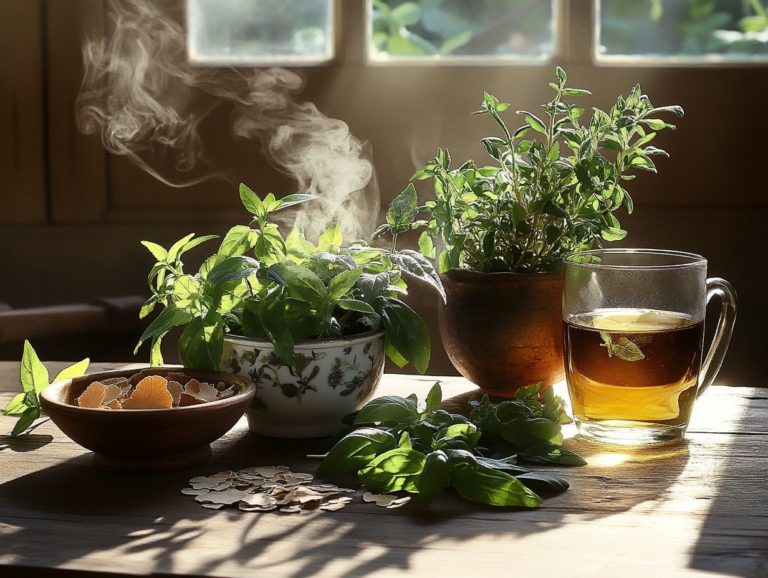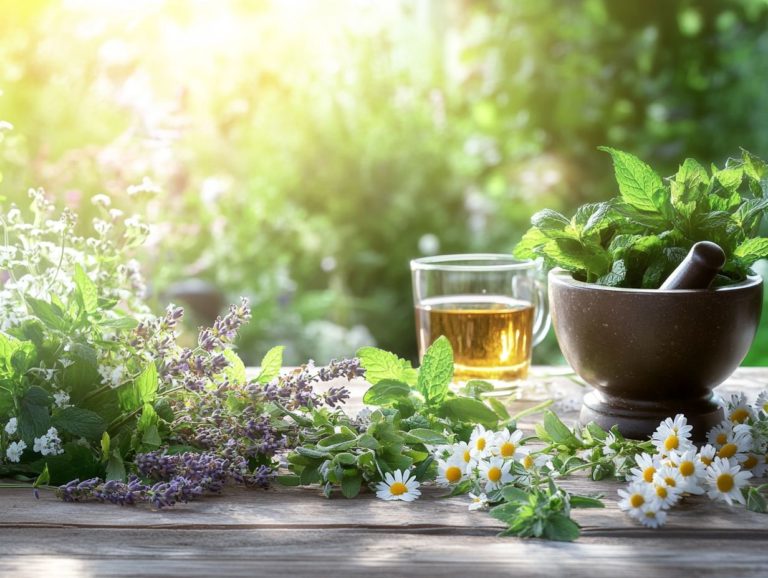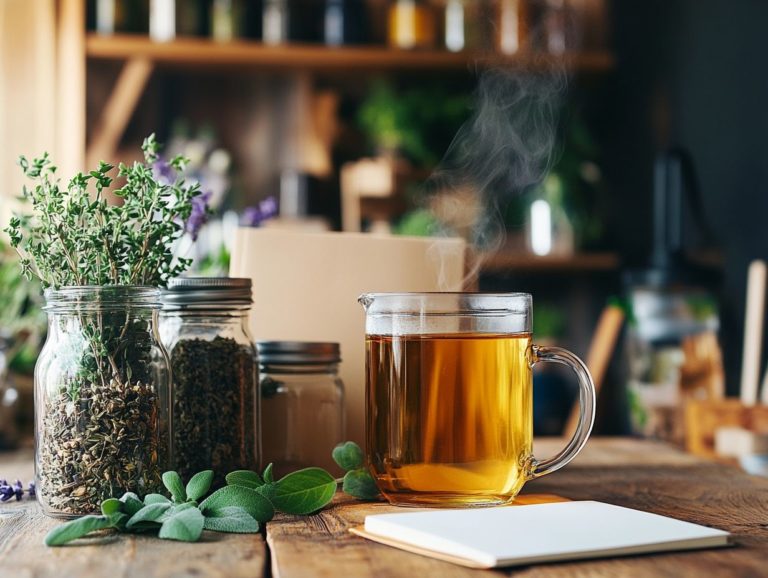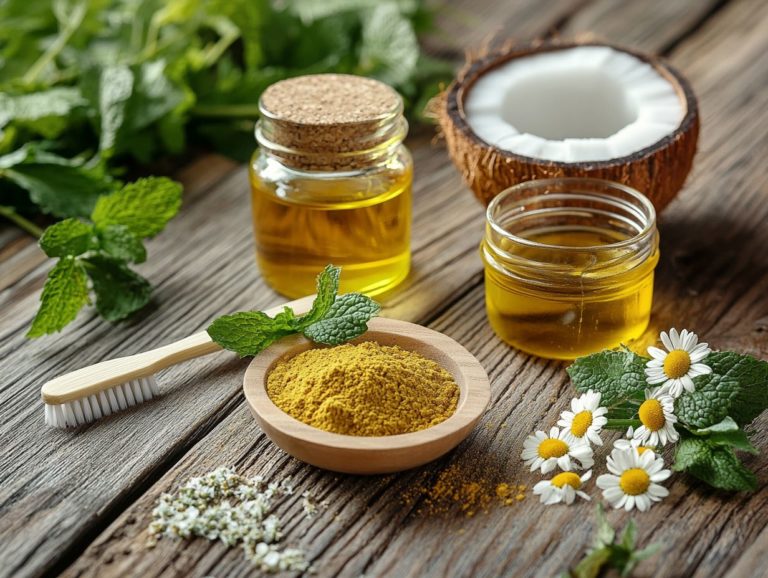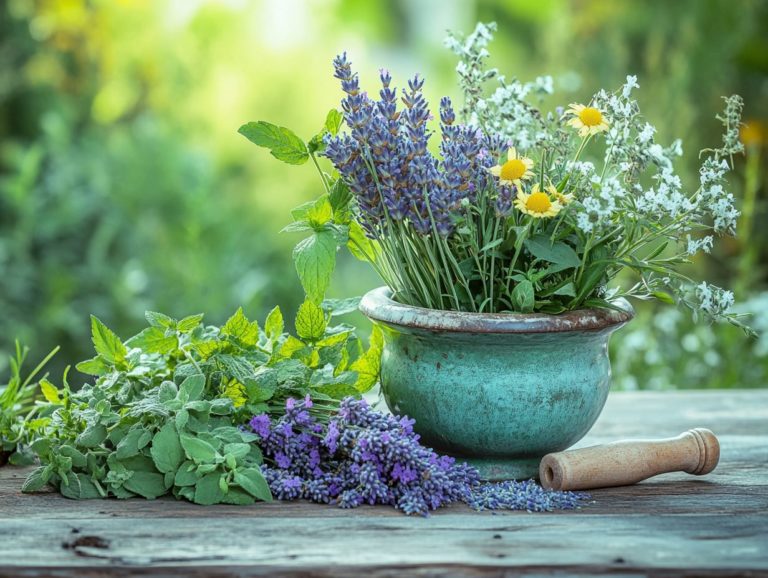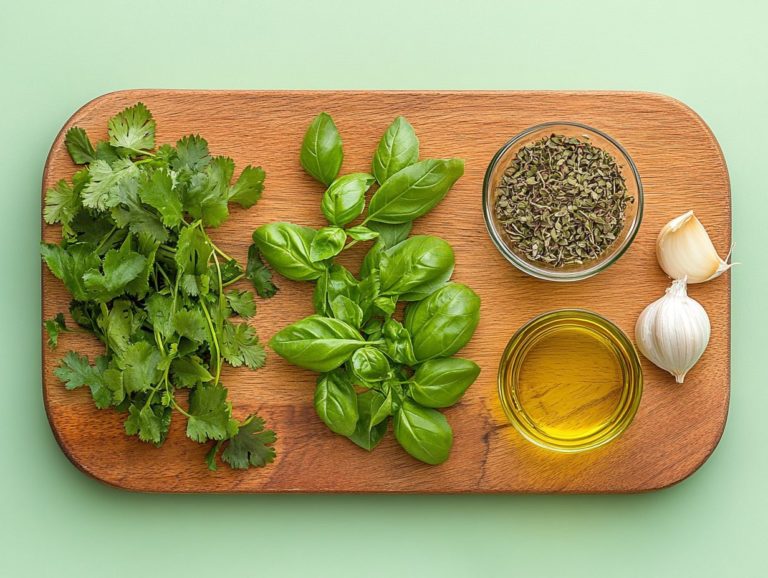Using Herbal Remedies for Emotional Wellbeing
In a world where stress and anxiety often take the spotlight, you might find yourself seeking solace in nature. Herbal remedies, cherished for centuries, offer a holistic pathway to emotional well-being. They provide a refreshing alternative for mental health support.
This article delves into the realm of herbal remedies, exploring their profound impact on emotional wellness. You ll uncover popular options such as St. John’s Wort, Lavender, and Chamomile, each with unique benefits.
We will guide you on selecting the ideal remedy for your needs, ensuring safe usage while seamlessly integrating these natural solutions into your self-care routine.
Discover how these time-honored plants can play a pivotal role in your mental health journey, helping you cultivate a sense of balance and tranquility.
Contents
- Key Takeaways:
- Understanding Herbal Remedies for Emotional Wellbeing
- Commonly Used Herbal Remedies
- Choosing the Right Herbal Remedy for You
- Using Herbal Remedies Safely
- Incorporating Herbal Remedies into Your Self-Care Routine
- Frequently Asked Questions
- What are herbal remedies and how can they help with emotional wellbeing?
- What are some commonly used herbs for emotional wellbeing?
- How do I know which herbal remedy is right for me?
- Are there any potential side effects of using herbal remedies for emotional wellbeing?
- How should I take herbal remedies for emotional wellbeing?
- Can herbal remedies be used with other treatments for emotional wellbeing?
Key Takeaways:
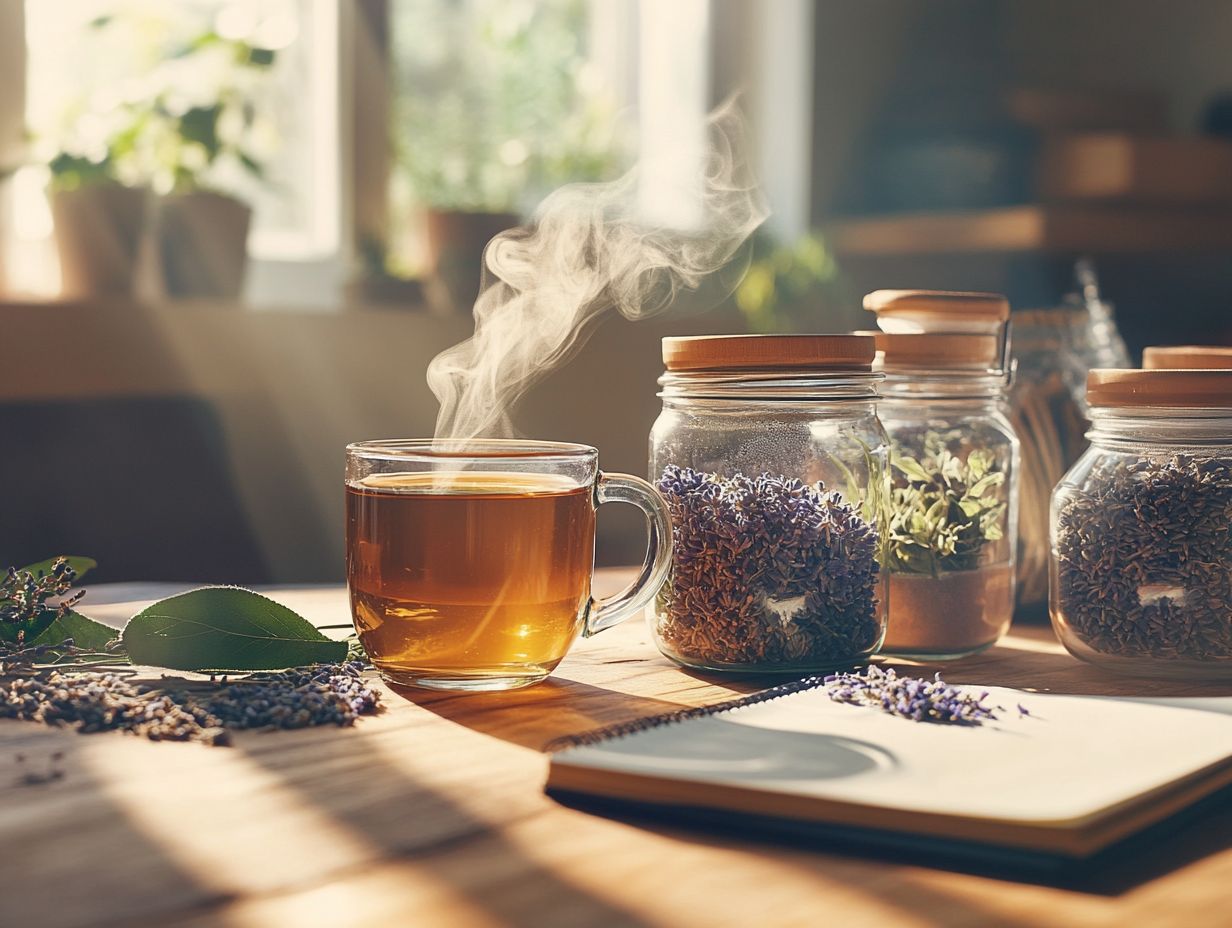
- Herbal remedies can play a significant role in promoting emotional well-being.
- Commonly used herbal remedies for emotional well-being include St. John’s Wort, lavender, and chamomile.
- When incorporating herbal remedies into your self-care routine, consider factors such as safety, effectiveness, and potential side effects and interactions.
Understanding Herbal Remedies for Emotional Wellbeing
Herbal remedies have been cherished for centuries across diverse cultures, from Traditional Chinese Medicine (TCM) to Ayurveda and Western herbalism. They nurture emotional well-being and mental health. These natural treatments involve a selection of herbs celebrated for their soothing properties and calming effects.
These remedies aid in managing stress and anxiety while enhancing overall wellness. The mind-body connection highlighted in these herbal traditions is instrumental in achieving emotional balance. This makes them an invaluable addition to your self-care routine and a holistic approach to managing stress, including top herbs for managing stress effectively.
What are Herbal Remedies?
Herbal remedies are natural treatments sourced from a variety of plants and herbs. They have historically been embraced in various traditional medicine systems to address a wide range of health conditions, including emotional and mental well-being.
Their applications can differ significantly across cultures and medicinal practices. For example, St. John’s Wort is deeply rooted in European herbal traditions. It is widely used for its antidepressant effects and is commonly recommended in Western herbalism to elevate mood.
On the other hand, Ashwagandha, a staple in Ayurvedic tradition, is revered for its adaptogenic properties. It helps the body manage stress and fosters overall balance. In the realm of Traditional Chinese Medicine (TCM), herbs like Ginseng are held in high regard for their energy-boosting and immune-enhancing benefits.
Exploring these diverse herbal applications highlights the rich tapestry of global healing practices and showcases how these traditions continue to evolve within contemporary wellness discussions.
How do they Impact Emotional Wellbeing?
Herbal remedies can significantly enhance your emotional well-being by helping to regulate brain chemicals, alleviating anxiety symptoms, and improving your stress management strategies.
Consider herbs like chamomile and valerian root, renowned for their ability to influence brain chemistry by boosting the production of GABA a calming neurotransmitter. Similarly, St. John’s Wort positively impacts serotonin levels, which play a key role in mood regulation.
Research shows that specific botanicals can lower cortisol levels in your body. Cortisol is the hormone that spikes during chronic stress. Reducing cortisol can pave the way for a more balanced emotional state and significantly improve your quality of life.
Imagine how these herbal remedies could transform your daily routine and boost your emotional balance! These insights highlight the potential for integrating herbal remedies into your life, providing you with natural alternatives to nurture emotional balance and build resilience against life s stressors.
Don’t wait! Start exploring these powerful herbal remedies today to elevate your emotional well-being!
Commonly Used Herbal Remedies
A variety of herbal remedies are celebrated for their ability to enhance emotional well-being. St. John’s Wort, Lavender, and Chamomile are among the most popular choices for herbalists and traditional medicine practitioners.
These herbs are known for their calming effects and soothing properties, offering a natural approach to emotional balance.
St. John’s Wort
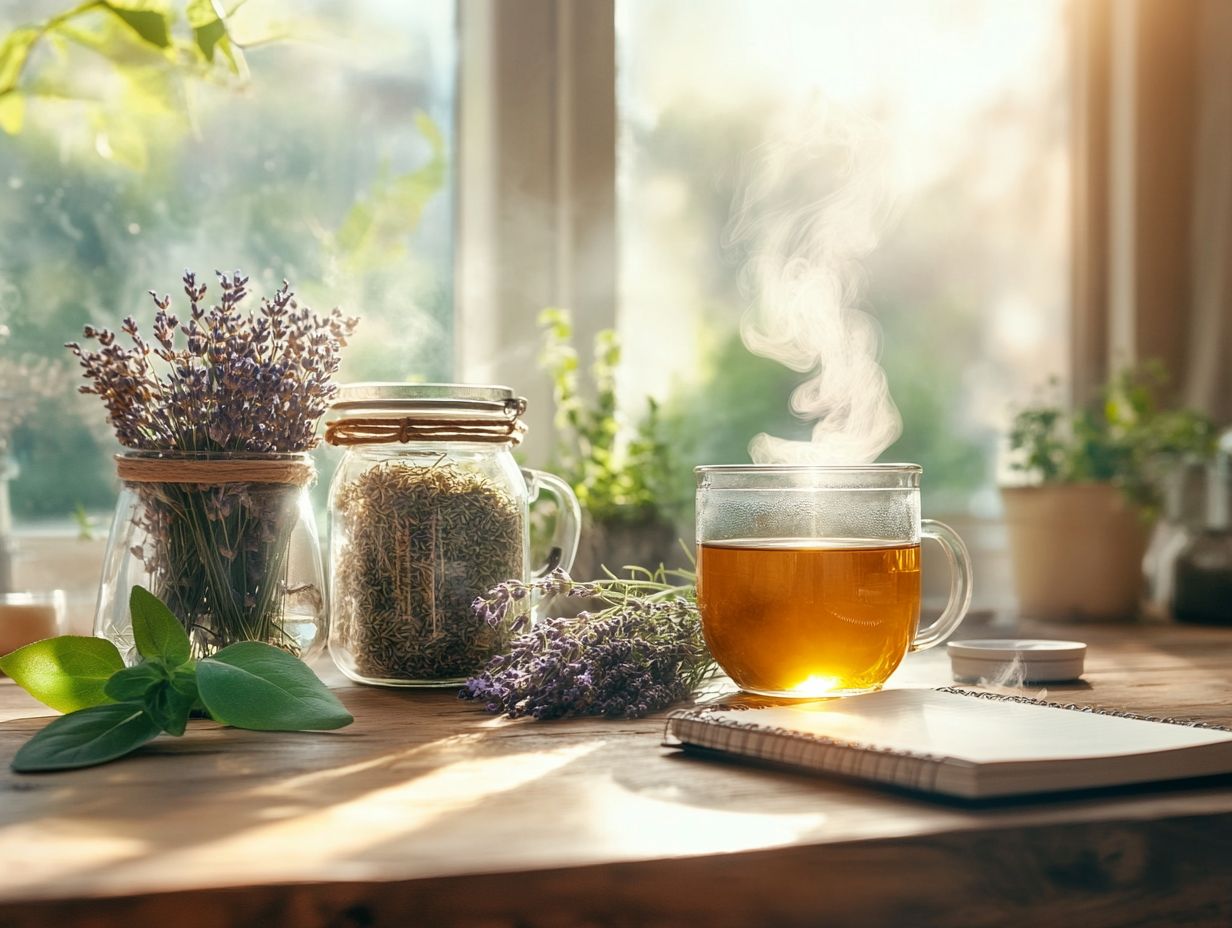
St. John’s Wort is a renowned herbal remedy known for its ability to alleviate depression and promote emotional balance. It is a highly sought-after choice in both Western herbalism and traditional medicine.
Scientifically named Hypericum perforatum, this remarkable herb has a rich history dating back to ancient Greece. Its effectiveness in addressing mild to moderate depression is due to its active compounds, particularly hypericin and hyperforin. These compounds are thought to positively influence serotonin levels in the brain.
Extensive studies, including meta-analyses, have shown that this herb may outperform some conventional antidepressants while having fewer side effects. Beyond mood enhancement, it has been used to support overall emotional wellness, sparking interest in its therapeutic benefits and holistic applications.
Lavender
Lavender is beloved for its soothing effects and is often used in aromatherapy the practice of using plant scents to promote relaxation and herbal remedies to reduce stress and foster relaxation.
This exquisite herb offers its benefits in various forms, such as essential oils, aromatic teas, and dietary supplements. Inhaling lavender essential oil or diffusing it can effectively reduce anxiety and create a calming atmosphere. Many enjoy brewing a comforting cup of lavender tea, providing a warm beverage that helps them unwind after a long day.
Recent research shows that lavender can help reduce anxiety symptoms and enhance emotional well-being. It has become a favored option for those seeking natural remedies for their mental health and overall wellness.
Chamomile
Chamomile is a beloved herb known for its amazing calming effects! It is often enjoyed as a tea, renowned for its ability to enhance sleep quality and alleviate anxiety symptoms, making it a comforting ally for stress relief.
Recent studies indicate that chamomile can significantly lower anxiety levels, making it an excellent choice for those seeking natural stress relief. Research published in reputable journals suggests that natural compounds found in chamomile may help regulate brain chemicals, fostering a sense of tranquility.
Beyond tea, chamomile is also available as extracts and essential oils, which can easily be integrated into your self-care routine whether through aromatherapy or skincare. These options allow you to choose your preferred method for experiencing chamomile’s calming effects, guiding you toward a more relaxed state of mind.
Choosing the Right Herbal Remedy for You
Selecting the ideal herbal remedy for your emotional well-being requires careful consideration. Reflect on your personal health conditions, any lifestyle changes you may be contemplating, and your specific emotional needs.
Each factor plays a crucial role in finding the most effective solution tailored just for you. Don’t miss out on the incredible benefits of these herbal remedies for your emotional well-being!
Factors to Consider
When you consider herbal remedies for emotional health, it s crucial to evaluate your personal health conditions, potential interactions with medications, and the lifestyle changes you might need to embrace.
Your emotional state significantly influences which herbal options will be most effective for you. Chronic stressors, whether they arise from work, relationships, or financial pressures, can have a considerable impact on your emotional well-being. It’s important to take these into account, and exploring DIY herbal remedies for stress relief can be a beneficial approach.
By understanding these stressors, you can steer yourself toward remedies that specifically target anxiety or enhance your mood. Additionally, your current self-care practices like diet, exercise, and mindfulness activities also play a crucial role in how your body responds to herbal interventions.
By thoughtfully assessing these dimensions, you can make informed choices that bolster your emotional resilience and support your overall mental health.
Using Herbal Remedies Safely
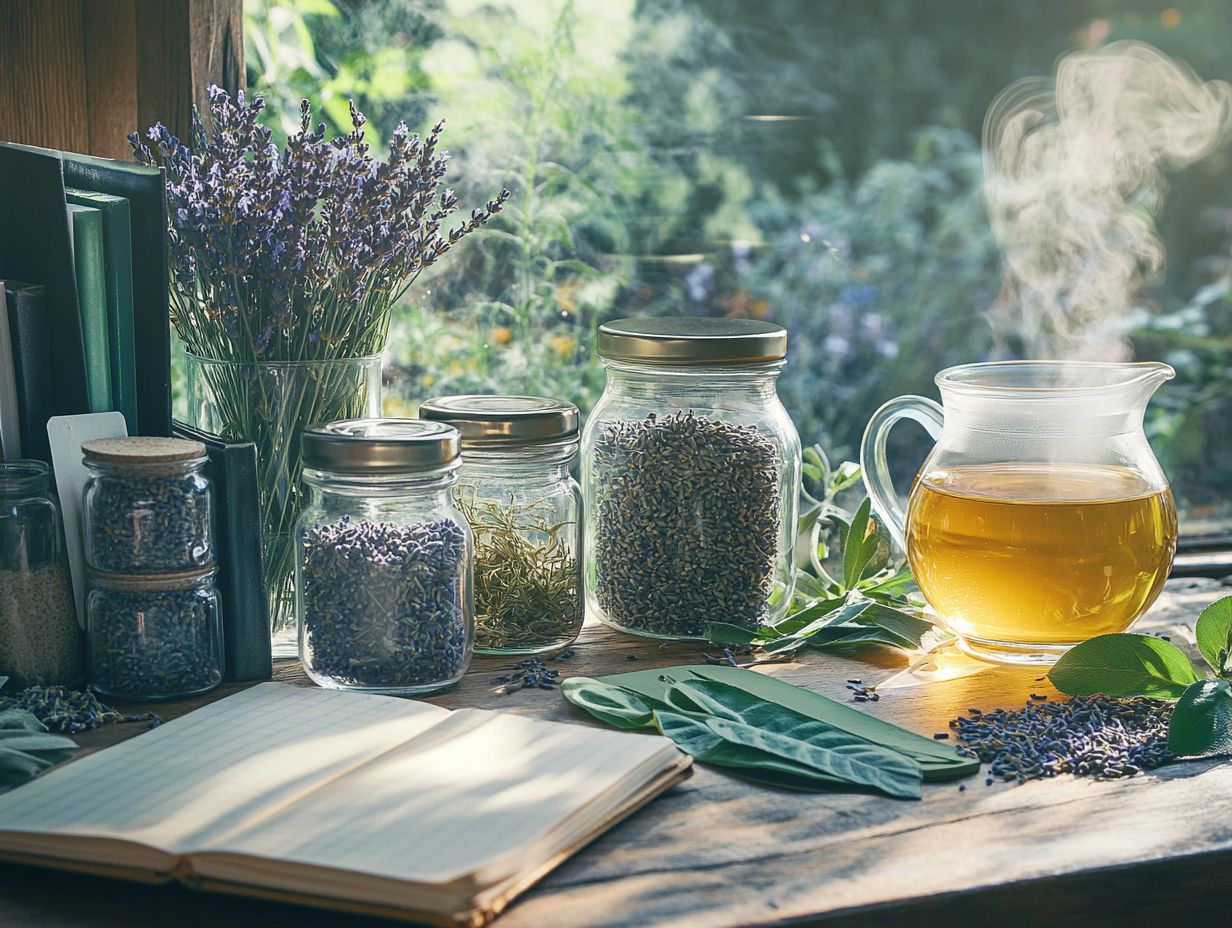
Using herbal remedies safely demands a solid understanding of potential side effects and interactions with other medications or health conditions. This knowledge equips you to make informed choices and ultimately enhances your emotional well-being.
Possible Side Effects and Interactions
Herbal remedies can indeed offer a plethora of benefits. However, it’s essential to be aware of the potential side effects and interactions to ensure both safety and effectiveness in promoting your emotional and mental health.
While many individuals gravitate toward herbs like St. John’s Wort for mood enhancement or valerian root for relaxation, these natural solutions come with their own set of risks. You might experience common side effects such as digestive upset, drowsiness, or even allergic reactions. These can vary from person to person and depend on the specific herb.
Interactions with conventional medications, such as antidepressants which are medications that help improve mood and emotional state or anxiety medications, can complicate your therapeutic journey.
To navigate these risks effectively, a thorough consultation with a healthcare professional is crucial. They can provide tailored advice that considers both your use of herbal remedies and any existing medications.
Make informed choices to unlock the benefits of herbal medicine and enhance your overall well-being.
Incorporating Herbal Remedies into Your Self-Care Routine
Incorporating herbal remedies into your self-care routine can significantly enhance your emotional well-being. These natural solutions offer a soothing path to relaxation and stress relief, all while promoting your overall wellness.
Tips for Incorporating Herbal Remedies into Your Daily Life
To seamlessly weave herbal remedies into your daily life, begin by establishing a consistent self-care routine that encompasses relaxation techniques and mindfulness practices.
By deliberately setting aside specific moments each day for calming teas, you create a soothing ritual that enhances your well-being and allows you to connect with the healing properties of nature.
Integrating herbal supplements into your meals or snacks provides a convenient way to tap into the myriad benefits of various herbs. When you pair these practices with mindfulness exercises, you elevate their impact even further.
Don t hesitate to experiment with different herbs and formulations. Dive in and explore options like chamomile for relaxation or ashwagandha for stress to find personalized strategies that truly resonate with your lifestyle.
Frequently Asked Questions
What are herbal remedies and how can they help with emotional wellbeing?
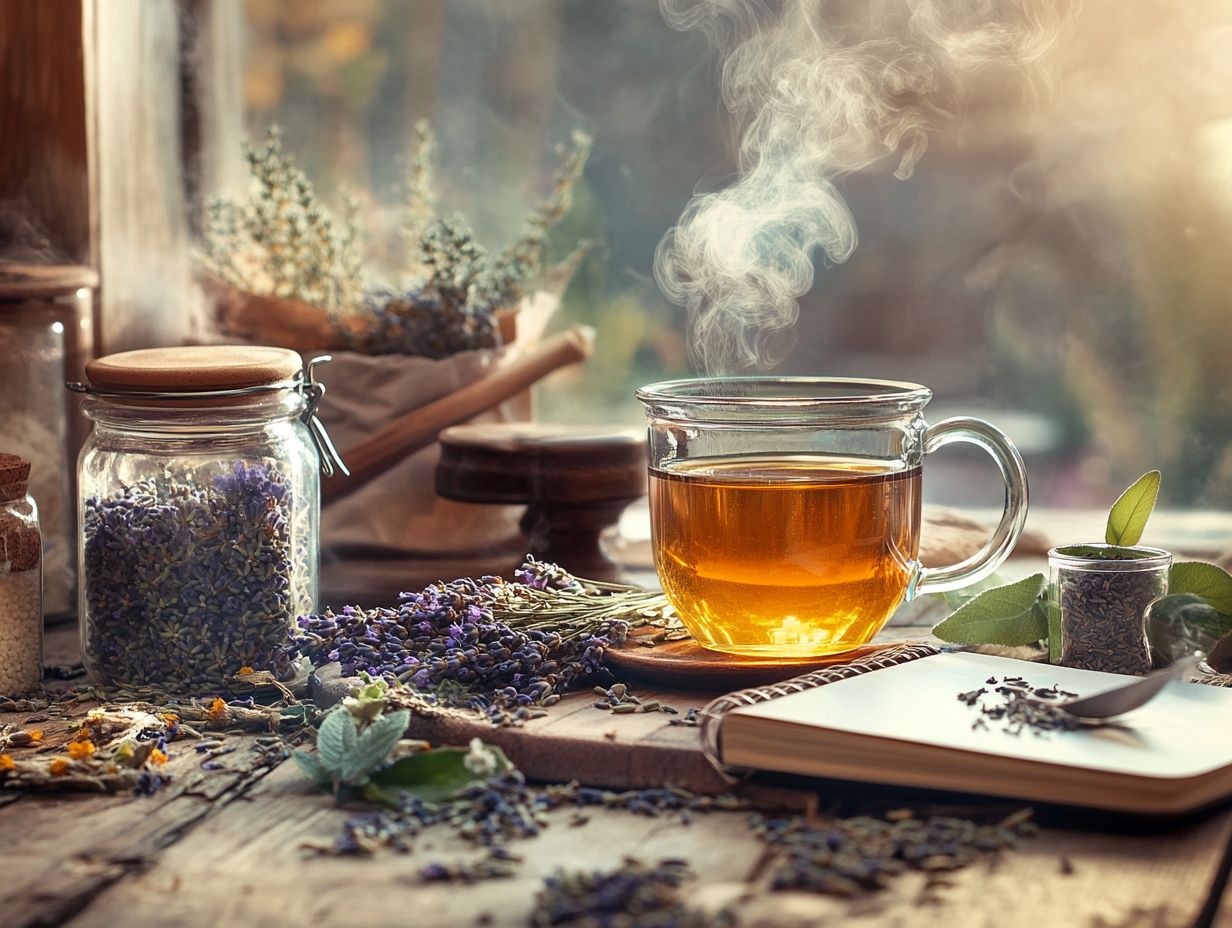
Herbal remedies are natural, plant-based substances that promote health and well-being. They can help with emotional well-being by balancing hormones, reducing stress and anxiety, and improving overall mood.
What are some commonly used herbs for emotional wellbeing?
Common herbs for emotional wellbeing include lavender, chamomile, St. John’s Wort, and valerian. These herbs are known for their calming and mood-boosting effects.
How do I know which herbal remedy is right for me?
Consult a doctor or trained herbalist to find the best herbal remedy for you. They can consider your health history and current medications to create a personalized plan.
Are there any potential side effects of using herbal remedies for emotional wellbeing?
Herbal remedies are generally safe, but it’s crucial to know about potential side effects. St. John’s Wort can interact with some medications, while valerian may cause drowsiness. Always talk to a doctor before trying new remedies.
How should I take herbal remedies for emotional wellbeing?
Herbal remedies come in many forms, such as teas, tinctures, capsules, and oils. Follow the dosage instructions on the packaging or from your healthcare provider to ensure effectiveness.
Can herbal remedies be used with other treatments for emotional wellbeing?
Yes, you can use herbal remedies along with therapy or medication. However, consult a doctor first to avoid any potential interactions or conflicts.

